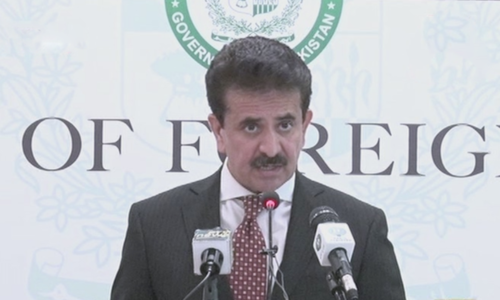Pakistan will not take responsibility if blamed for deteriorating Afghan peace: Qureshi

Foreign Minister Shah Mahmood Qureshi on Monday said that Pakistan would not take responsibility if it was blamed for any deterioration in the Afghan peace process.
Addressing the inaugural session of the Pak-Afghan Bilateral Dialogue in Islamabad, the foreign minister said Afghan President Ashraf Ghani and a core group would reportedly be travelling to Washington soon.
"I wish them luck and a good visit but let me spell it down in advance. If the objective of going to Washington is starting a new blame game and holding Pakistan responsible for all the ills [in Afghanistan] and the lack of [progress in the peace] process, then it will not help.
"It is a shared responsibility and nobody is going to buy it anymore that if things go wrong [then] Pakistan is responsible. We will not take responsibility," said the foreign minister, adding that Pakistan was "honest and sincere" in building a peace process in Afghanistan.
"We have been accused enough."
He said it was up to Afghans to decide the way forward for the country and find people who could do that. "Afghanistan needs leadership that can negotiate a successful outcome [and] that can transit this country into peace and is not worried about perpetuation [and] hanging on to power."
Qureshi stressed that Pakistan wanted to partner with Afghanistan, the region and the US to counter terrorism, adding that Pakistan had suffered and "paid a price" in lives lost, soldiers martyred, mosques bombed and loss to the economy.
"I as the elected representative of Pakistan, do not want to see 'Talibanisation' of Pakistan. How can I be more clear than that?," said FM Qureshi, adding that his vision of the country was based on the values advocated by Quaid-e-Azam Mohammad Ali Jinnah.
He said Pakistan had taken a "very clear decision" to not interfere in the internal affairs of Afghanistan.
"We have no favourites, There is a general buzz that we are advocates of the Taliban. I am not and I don't represent them, I represent Pakistan. Taliban are Afghans," the foreign minister emphasised.
He said multiple Afghan leaders from "every ethnic group" had been invited to Islamabad to send the clear message that Pakistan wanted to engage with all ethnic communities and leaders "who matter and are important for peace and reconciliation".
"That is why we have been inviting you and will continue to invite your leadership to achieve our common objective of peace and stability."
FM Qureshi stressed that "time is running out" and there was a need to find leadership which enjoyed the confidence of Afghans. He urged the Afghan leadership and the Taliban to show flexibility, adding that the region would go nowhere if they continued to stick to their positions.
Qureshi said Pakistan and Prime Minister Imran Khan had been advocating for years that there was no military solution to the Afghan conflict.
He recalled that the prime minister had been called 'Taliban Khan' by many for his stance but the world was now recognising what he said and agreeing with him that the only solution was a negotiated settlement.
He said there was a "new international convergence" on the stance since the world had seen in 20 years that the most "sophisticated armies, weaponry and technology" could not bring peace in Afghanistan.
Regarding vindication of Pakistan's stance, Qureshi said he had seen a "very positive change" during his interactions with US legislators last month. "Today in the US we are looking at Pakistan not as part of the problem but part of the solution," he said, quoting US Senator Lindsey Graham, hailing it as a "paradigm shift in [US] approach”.
The foreign minister reiterated that a "blame game" between Afghanistan and Pakistan would not achieve anything and called for it to stop. He said among some of the impediments he saw were a lack of intra-Afghan trust and a "trust deficit between Pakistan and Afghanistan".
Qureshi stressed there was a need to "forget the past and look at the future". He said Pakistan was committed to building bridges instead of "sowing seeds of dissent".
"Trust us when we say that a peaceful and stable Afghanistan is in Pakistan's interest."
He said he was concerned and disappointed by statements from the Afghan vice president and national security adviser, adding that statements which vitiated the climate between the two countries went against the spirit of the Afghanistan-Pakistan Action Plan for Peace and Solidarity.
He also responded to accusations that elements in Pakistan were involved in instigating trouble in Afghanistan through cross-border movement. Qureshi said Pakistan was doing "everything possible" for better border management.
"Hold me accountable when all my Afghan brothers and sisters have honourably returned home and then if there are movements and there is trouble [in Afghanistan], we will shoulder responsibility."
He reiterated that the "time has come for a honourable and dignified return of Afghan refugees [back to their] home."
The foreign minister also addressed the important role of women in Afghanistan and said they couldn't be overlooked, adding that he was proud of the women excelling in various fields in Pakistan as well.
"Twenty years is a long time and reforms have taken place. The Afghanistan of today is not the Afghanistan which was 20 years ago. The role of women in Afghan national life is extremely important."
He emphasised that there was a new situation of "complete withdrawal" of US and allied forces from Afghanistan which had given rise to many concerns such as an increase in violence, a stalemate in negotiations, an increase in influx of refugees [to Pakistan], the expanding footprint of militant outfits and a possibility of civil war if there was no peace settlement.












































